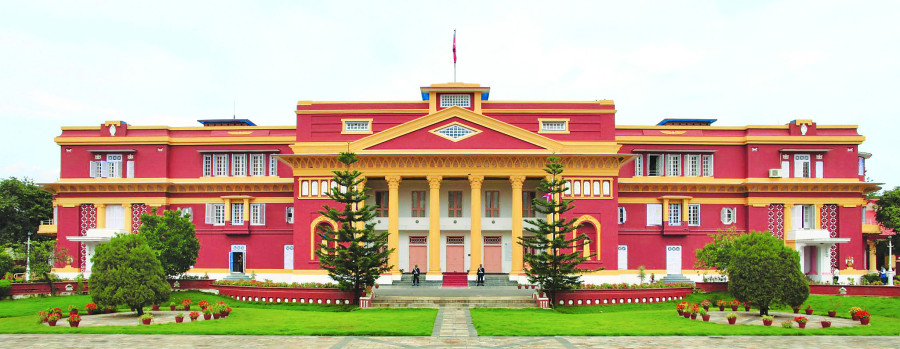Politics
Excessive haggling for President worries watchers
The head of state’s perceived influential role could potentially infringe on the authority of the executive, as some instances in the past have shown.
Nishan Khatiwada
The presidential election is making headlines everyday over the past few days with major political parties intensifying negotiations as they haggle over who gets to appoint the new head of state. Saturday has been fixed for nominating candidates for President and the election will be held on March 9.
Although Nepal has seen just two Presidents since it became a republic in 2008, the largely ceremonial post has not been without controversy as parties attempt to misuse the head of the state to serve their vested interests. The ongoing trend of dragging the presidency into controversy is dangerous, warn observers and experts.
Political analyst Krishna Khanal said, although Nepal’s republican experience is in its nascent stage, the Presidents have not been without blemish. “What needs to be feared the most is that our Presidents have been overstepping their bounds. It could also lead to an undeclared semi-presidential system. If a high-profile politician who has already held an executive position becomes President, will they remain unbiased and limit themselves to formal roles?”
In all this constitutional expert Bipin Adhikari sees the prime minister losing the executive authority. “If we look at the ongoing wheeling and dealing among leaders to secure the presidential post, I fear there won’t be an environment for the prime minister to freely exercise executive authority,” he said.
The President is envisioned as the head of the state and custodian of the constitution. Largely, the head of the state does not have discretionary authority. The President’s main responsibility is to authenticate Cabinet’s decisions. But, political engagement of Nepali heads of state—first president Dr Ram Baran Yadav and the current president Bidya Devi Bhandari—courted some serious controversies during their tenures.
Yadav’s decision to reinstate Army chief Rookmangud Katawal who was sacked by prime minister Pushpa Kamal Dahal in 2009 had led to political instability. Dahal stepped down from the prime ministerial position and the Maoist party launched a general strike demanding “restoration of civilian supremacy, which was hijacked by the President by revoking the decision of an executive prime minister”.
Yadav, who was believed to be loyal to the Koirala camp in the Nepali Congress, had also courted controversy for his alleged lobbying against the Deuba faction in the party. On many occasions Yadav, despite being the country’s President, had allegedly interfered in the party’s internal affairs.
The incumbent President Bidya Devi Bhandari got into even more controversies. The then Nepali Congress chief Sher Bahadur Deuba-led government in 2018 had recommended four names for appointment as members of the National Assembly. However, she didn’t appoint them and waited until the government was changed. Later, she endorsed four other names recommended by the government led by KP Sharma Oli of CPN-UML, her former party.
In December 2020, President Bhandari promptly endorsed the recommendation of the Oli government to dissolve the House while he was still leading a majority government. She did the same for the second time in May 2021, when Oli dissolved the House again. Last year, she expressed her reservations against several provisions of the bill to amend the Citizenship Act-2006 and allowed it to lapse, thereby leaving at least half a million stateless people waiting for the bill’s passage without citizenship.
Experts warn that politicians have been trying to influence the executive via the Speaker and President.
“The way the political parties are haggling for a ceremonial post, it is clear that they intend to misuse the rights of the head of the state,” says Adhikari, the constitutional expert.
Looking at the way the Speaker was elected and ongoing efforts to use the post of President as a countervailing power against the executive, it is clear that the very bases of the parliamentary system are being weakened by the political parties themselves, said Adhikari.
The business of the parliament has been affected as the parties and their lawmakers keep themselves busy in political manoeuverings in the run-up to the presidential elections. A bill could not be presented for consideration at Friday’s House of Representatives meeting for lack of a quorum. Just 50 lawmakers were present at the 275-strong House.
“Parliament is not getting business. The wheeling and dealing for the Presidential elections is pushing the country toward darkness,” said political analyst Khanal. “They are showing disloyalty to the constitution, which they themselves made. It is okay for parties to vet Presidential candidates, but this is too much.”
Foreign powers have been active and reportedly trying to influence the presidential elections openly this time.
President Bhandari had courted controversies because of her engagement in geopolitical affairs as well. Despite reservations from the Ministry of Foreign Affairs, President Bhandari sent her recorded statement to a Global Security Initiative-related function organized by the Chinese People’s Association for Peace and Disarmament in Beijing on September 21, 2022.
Recently, the Indian foreign secretary met all key political leaders of the major political parties and reportedly expressed interest in the presidential elections.
Prior to the meeting between Prime Minister Dahal and UML chair Oli, Chinese ambassador Chen Song had called on Prime Minister Dahal on Wednesday morning. Sources said the Chinese envoy spoke in favour of continuing the ruling left alliance. He also held a meeting with CPN (Unified Socialist) Chairman Madhav Kumar Nepal on Wednesday.
Foreign affairs expert Khadga KC said, previous presidents were directly or indirectly influencing national security issues, so a perception exists among foreign forces that in Nepal’s context the presidential position is very crucial.
“Foreign powers, especially our neighbors, have on various occasions interfered in our internal matters. If recent developments regarding the presidential elections are anything to go by, other foreign powers have followed suit and this will further weaken the nation building process,” said KC.




 10.12°C Kathmandu
10.12°C Kathmandu















